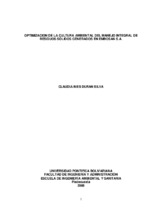| dc.contributor.advisor | Santoyo Muñoz, Claudia | |
| dc.contributor.author | Duran Silva, Claudia Ines | |
| dc.coverage.spatial | Seccional Bucaramanga. Universidad Pontificia Bolivariana. Escuela de Ingenierías. Facultad de Ingeniería Ambiental | spa |
| dc.coverage.temporal | 2008 | |
| dc.date.accessioned | 2013-08-28T16:59:40Z | |
| dc.date.available | 2013-08-28T16:59:40Z | |
| dc.date.created | 2010-08-09 | |
| dc.date.issued | 2013-08-28 | |
| dc.identifier.uri | http://hdl.handle.net/20.500.11912/891 | |
| dc.description | 128p.: (pdf); il; gráficas; tablas; anexos | spa |
| dc.description.abstract | La gestión ambiental adecuada de residuos sólidos industriales es una práctica y una necesidad que empieza a hacerse importante en Colombia a medida que la población comienza a tomar conciencia y a experimentar los daños provocados por la acción de algunos contaminantes. Para alcanzar este objetivo es necesario adoptar un enfoque integral que incorpore una visión sobre el ciclo de vida ampliado, tanto del producto como del residuo. Es por esto que EMBOSAN ha Iniciado la implementación del Sistema de Gestión Ambiental, donde el manejo integral de residuos sólidos es fundamental para la implementación del sistema. El principal problema detectado es la falta de cultura por parte de los trabajadores, lo que requiere optimizar la cultura ambiental del manejo integral de residuos sólidos por medio de estrategias de carácter pedagógico y operativo. Es por esto que la empresa ha querido optimizar el plan de manejo integral de residuos sólidos con programas de capacitación e implementación de nuevos programas de disposición final de los residuos generados en la planta, iniciando con un diagnóstico de la situación del manejo de residuos sólidos y posteriormente se dará inicio a la implementación y optimización del Plan de Manejo Integral de Residuos Sólidos. De acuerdo a la caracterización de residuos sólidos se estableció que de los residuos generados, el 59.5% son reciclables, 11.9% son inertes y ordinarios, 9.5% son no reciclables, 7.1% son químicos, 4.7% son sanitarios, 4.7% son biodegradables y 2.3% pilas y baterías. Con el seguimiento realizado a la disposición final de los residuos sólidos se pudo establecer que se esta cumpliendo la política ambiental de la empresa y que la disposición de los residuos se está realizando adecuadamente. Con las adecuaciones hechas al manejo de residuos sólidos dentro de la empresa se cumple con la legislación ambiental vigente. | spa |
| dc.description.abstract | Appropriate environmental management of industrial solid waste is a practice and a necessity that starts to become important in Colombia as the population begins to awareness and experiencing damage caused by the action of some contaminants. To achieve this objective it is necessary to take a holistic approach that incorporates a vision on the extended life both product and waste. Is this that EMBOSAN has started the implementation of the system of environmental management, where comprehensive solid waste management is essential for the implementation of the system. The main problem encountered is the lack of culture from the workers, which requires optimizing environmental culture of the integrated management of solid waste by nature educational and operational strategies. It is for this reason that the company wanted to optimize the plan for integrated management of solid waste programs of training and implementation of new programs of final disposal of the waste generated in the plant, starting with a diagnosis of the situation of solid waste management, and then will start to deployment and optimization of integral solid waste management plan. According to the characterization of solid waste was established that from the waste generated, the 59.5% are recyclable, 11.9% are inert and ordinary, 9.5% are not recyclable, 7.1% are chemical, 4.7% are health, 4.7% are biodegradable and 2.3% cells and batteries. With the follow-up to the final disposal of solid waste could be established that it is complying with the environmental policy of the company and the disposal of waste is being properly. With the adjustments made to the management of solid waste of enterprise it complies with current environmental legislation. | |
| dc.language.iso | es | |
| dc.publisher | Universidad Pontificia Bolivariana | spa |
| dc.rights | Attribution-NonCommercial-NoDerivatives 4.0 International | * |
| dc.rights.uri | http://creativecommons.org/licenses/by-nc-nd/4.0/ | * |
| dc.subject | Tesis y disertaciones académicas | spa |
| dc.subject | Ingeniería ambiental | spa |
| dc.subject | Residuos sólidos | spa |
| dc.subject | Gestión ambiental | spa |
| dc.subject | Medio ambiente | spa |
| dc.title | Optimización de la cultura ambiental del manejo integral de residuos sólidos generados en Embosan S.A | spa |
| dc.type | workingPaper | spa |
| dc.rights.accessRights | openAccess | spa |
| dc.type.hasVersion | publishedVersion | spa |
| dc.identifier.instname | instname:Universidad Pontificia Bolivariana | spa |
| dc.identifier.reponame | reponame:Repositorio Institucional de la Universidad Pontificia Bolivariana | spa |
| dc.identifier.repourl | repourl:https://repository.unab.edu.co/ | |


